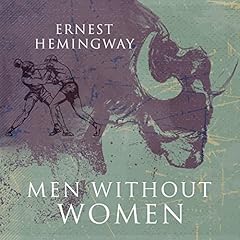
Men Without Women
No se pudo agregar al carrito
Add to Cart failed.
Error al Agregar a Lista de Deseos.
Error al eliminar de la lista de deseos.
Error al añadir a tu biblioteca
Error al seguir el podcast
Error al dejar de seguir el podcast
 Exclusivo para miembros Prime: ¿Nuevo en Audible? Obtén 2 audiolibros gratis con tu prueba.
Exclusivo para miembros Prime: ¿Nuevo en Audible? Obtén 2 audiolibros gratis con tu prueba.Compra ahora por $14.65
-
Narrado por:
-
Jack de Golia
-
De:
-
Ernest Hemingway
Men Without Women is a collection of short stories by Ernest Hemingway, published together in 1927. His long writing career had begun in earnest, when a major work, The Sun Also Rises, published to acclaim in 1926. The stories in Men Without Women mostly don't include women, though "Hills Like White Elephants" is all about a couple skirting around the issue of abortion, and "A Canary for One" involves two women and a man. One story, "Today is Friday," was written as a play, though modified in this audiobook for ease of listening and omitting the play format's naming of each character's lines. This story is written as if Roman soldiers spoke in American dialects and accents and narrated accordingly. Modern listeners may be jarred by the use of the "N word" in "The Killers," and to a much lesser extent in "Fifty Grand." As offensive as the term was then and is now, the term gives added insight into the social structures and attitudes of a century ago.
In all the stories, we find Hemingway's groundbreaking spare style of writing that, with a few words, paint vibrant pictures and symbols for readers and listeners. Some stories are about striving against the odds, though you're left to wonder if the character isn't just blind to his own limitations. Many stories end ambiguously, unresolved. Whether the topic is bullfighting, prizefighting, or gangsters on the hunt, all carry the author's psychic and physical scars from World War I. Hemingway himself had been seriously wounded in 1918 in Italy during his Army service there.
All the stories address issues faced by the "Lost Generation" that he was part of. Those were men for whom faith in the world was shattered by the Great War. From the experience, they wander, wonder, and struggle, flawed and damaged people, still taking on the world as best they can, but with flaws and weaknesses evident to all but themselves. That approach and that style were groundbreaking in the 1920s, after decades of wordy writing. And, they have stood the test of time, sometimes bringing us up short to realize the world as it is.
Public Domain (P)2023 Jack de GoliaLos oyentes también disfrutaron:




















Las personas que vieron esto también vieron:



